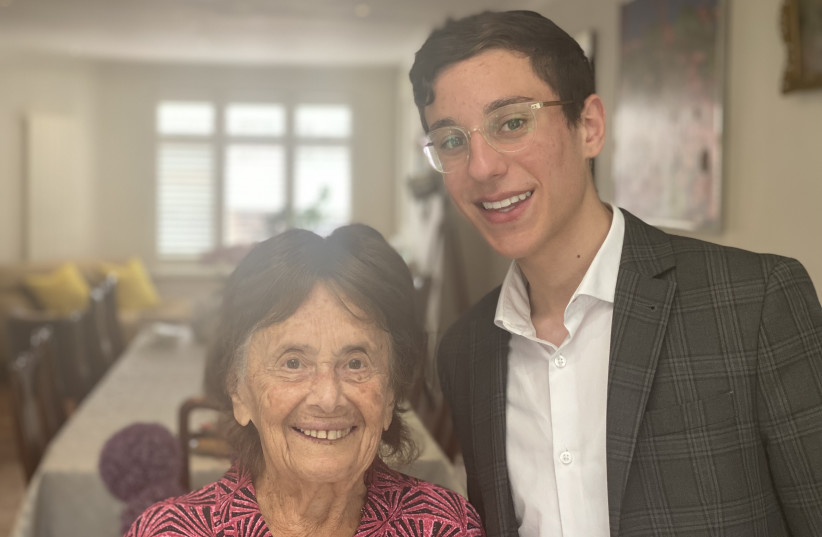OSWIECIM, Poland – Can the world rely on social media to educate the young on the horrors of the Holocaust? With thousands of teens from around the globe at the March of the Living and a swath of social media influencers invited by organizers to cover the events of the day, there may not be much of an alternative.
Studies show that millennials and Gen-Z do not know enough about the Holocaust.
Teenagers don't have enough knowledge
During the march from Auschwitz to Birkenau, including more than 13,000 participants, teenagers spoke among themselves. One young woman admitted, “I don’t understand what this was,” gesturing to her surroundings.
Young people, like 19-year-old Dov Forman from the United Kingdom, are out to change the way contemporaries consume Holocaust information. While Forman has co-authored The New York Times best-selling book Lily’s Promise about the Holocaust, with a forward written by King Charles III, much of his fame actually comes from his social media posts.
During the COVID-19 lockdowns, Forman’s grandmother, a Holocaust survivor, could no longer tell her story, so Forman began filming her on TikTok; the two became overnight sensations.

His social media accounts currently have more than two million followers, with over a billion views of his videos.
Forman says that today’s younger generation knows so little about the Holocaust, and he has the proof. He said that every day he wakes up to thousands of questions on TikTok that to him seem ignorant or rude, but he recognizes that they come from a lack of knowledge. He blames faulty education systems worldwide.
“The new form of Holocaust education on social media is not the optimal way and we don’t want it to replace books or survivor testimonies, but it is another way to engage the younger generation’s interest. These are the adults that will be building our world,” he said.
United States Ambassador to Israel Tom Nides would agree. He was invited to light a torch at the March of the Living closing ceremony on the evening of Holocaust Remembrance Day. Nides told The Jerusalem Post that he feels his job as ambassador is to fight antisemitism at its roots.
“I don’t really care how kids learn about the Holocaust. I just want them to learn about [it],” he said. “I want them to know six million people died.”
Opposing views on social media
FORMER US ambassador to Israel David Friedman weighed in on the issue – but with an opposite view, saying, “Social media is a mere entry point into Holocaust education and that’s great. But it also offers a narrow, incomplete and shallow view of the Holocaust or any subject.
“People need to go to museums and then come here [to Auschwitz]. It’s the most powerful thing,” he said. “When I was in seventh grade, I read Night by Elie Wiesel. It really transformed my life. It didn’t occur to me that something like this could happen. We need to become fluent in Holocaust literature and really understand what happened. It’s more than social media.”
Yarden Vizel is a social media influencer with a following of about 325,000 on Instagram. She came into the public eye after participating in Israel’s Amazing Race reality TV show. March of the Living asked her to join the march, to publish photos and images, as a way to spread the organization’s message. Vizel told the Post that she’s been focused on documenting everything because she is aware that the survivors around her are among the last, calling the mission of capturing their images in an Instagram story “holy.”
While her page is mostly in Hebrew, Instagram has widely available translations and, she said, pictures speak louder than words.
“The world has changed. I’m grateful to the March of the Living because they understand that the young generation takes the content from cellphones. It’s not a shame. It’s a way to bring the young children such important facts,” she said.
Israeli students have the opportunity during high school to visit Poland. But last June Israel canceled its annual trips after a diplomatic scuffle with Poland due to Israeli officials being unhappy with Poland’s request to restrict Israeli security protecting the delegations. The Education Ministry sent a note to 7,000 students saying their impending trips were canceled. In March of 2023, ties were restored and trips reinstated – with the compromise that Israeli students would also have to visit sites important to the Polish public during World War II.
Education Minister Yoav Kisch discussed Israel’s efforts to educate the young before beginning the march, saying that TikTok and other platforms are simply new channels to explain what happened in Auschwitz.
“This [march] is a good reminder for why it is important to be here and that’s why I’m so happy the Israeli government chose to bring back the tours to Auschwitz, which are so important,” he said.
During the day, the hashtag #holocaust was used 805,000 times on Instagram, while a stream content with the tag “Holocaust” has been posted on TikTok, including a clip watched 14 million times of the sleeping arrangements in Auschwitz army barracks. At the bottom is a prompt asking the viewer to click in order to “learn the facts about the Holocaust.”
